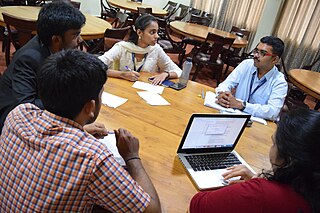Related Research Articles

Cultural anthropology is a branch of anthropology focused on the study of cultural variation among humans. It is in contrast to social anthropology, which perceives cultural variation as a subset of a posited anthropological constant. The umbrella term sociocultural anthropology includes both cultural and social anthropology traditions.

Ethology is the scientific and objective study of animal behaviour, usually with a focus on behaviour under natural conditions, and viewing behaviour as an evolutionarily adaptive trait. Behaviourism as a term also describes the scientific and objective study of animal behaviour, usually referring to measured responses to stimuli or to trained behavioural responses in a laboratory context, without a particular emphasis on evolutionary adaptivity. Throughout history, different naturalists have studied aspects of animal behaviour. Ethology has its scientific roots in the work of Charles Darwin (1809-1882) and of American and German ornithologists of the late 19th and early 20th century, including Charles O. Whitman, Oskar Heinroth (1871-1945), and Wallace Craig. The modern discipline of ethology is generally considered to have begun during the 1930s with the work of Dutch biologist Nikolaas Tinbergen (1907-1988) and of Austrian biologists Konrad Lorenz and Karl von Frisch (1886-1982), the three recipients of the 1973 Nobel Prize in Physiology or Medicine. Ethology combines laboratory and field science, with a strong relation to some other disciplines such as neuroanatomy, ecology, and evolutionary biology. Ethologists typically show interest in a behavioural process rather than in a particular animal group, and often study one type of behaviour, such as aggression, in a number of unrelated species.
Ethnography is a branch of anthropology and the systematic study of individual cultures. In contrast with ethnology, ethnography explores cultural phenomena from the point of view of the subject of the study. Ethnography is also a type of social research involving the examination of the behaviour of the participants in a given social situation and understanding the group members' own interpretation of such behaviour.

A focus group is a small, but demographically diverse group of people and whose reactions are studied especially in market research or political analysis in guided or open discussions about a new product or something else to determine the reactions that can be expected from a larger population. The use of focus groups is a research method that is intended to collect data, through interactive and directed discussions by a researcher.
In marketing and the social sciences, observational research is a social research technique that involves the direct observation of phenomena in their natural setting. This differentiates it from experimental research in which a quasi-artificial environment is created to control for spurious factors, and where at least one of the variables is manipulated as part of the experilovement.
Qualitative marketing research involves a natural or observational examination of the philosophies that govern consumer behavior. The direction and framework of the research is often revised as new information is gained, allowing the researcher to evaluate issues and subjects in an in-depth manner. The quality of the research produced is heavily dependent on the skills of the researcher and is influenced by researcher bias.
Qualitative psychological research is psychological research that employs qualitative methods.
Participant observation is one type of data collection method by practitioner-scholars typically used in qualitative research and ethnography. This type of methodology is employed in many disciplines, particularly anthropology, sociology, communication studies, human geography, and social psychology. Its aim is to gain a close and intimate familiarity with a given group of individuals and their practices through an intensive involvement with people in their cultural environment, usually over an extended period of time.
Social research is a research conducted by social scientists following a systematic plan. Social research methodologies can be classified as quantitative and qualitative.
Abuse is the improper usage or treatment of a thing, often to unfairly or improperly gain benefit. Abuse can come in many forms, such as: physical or verbal maltreatment, injury, assault, violation, rape, unjust practices, crimes, or other types of aggression. To these descriptions, one can also add the Kantian notion of the wrongness of using another human being as means to an end rather than as ends in themselves. Some sources describe abuse as "socially constructed", which means there may be more or less recognition of the suffering of a victim at different times and societies.

Human subject research is systematic, scientific investigation that can be either interventional or observational and involves human beings as research subjects, commonly known as test subjects. Human subject research can be either medical (clinical) research or non-medical research. Systematic investigation incorporates both the collection and analysis of data in order to answer a specific question. Medical human subject research often involves analysis of biological specimens, epidemiological and behavioral studies and medical chart review studies. On the other hand, human subject research in the social sciences often involves surveys which consist of questions to a particular group of people. Survey methodology includes questionnaires, interviews, and focus groups.

In sociology, interactionism is a theoretical perspective that derives social processes from human interaction. It is the study of how individuals shape society and are shaped by society through meaning that arises in interactions. Interactionist theory has grown in the latter half of the twentieth century and has become one of the dominant sociological perspectives in the world today. George Herbert Mead, as an advocate of pragmatism and the subjectivity of social reality, is considered a leader in the development of interactionism. Herbert Blumer expanded on Mead's work and coined the term "symbolic interactionism".
In sociology and statistics research, snowball sampling is a nonprobability sampling technique where existing study subjects recruit future subjects from among their acquaintances. Thus the sample group is said to grow like a rolling snowball. As the sample builds up, enough data are gathered to be useful for research. This sampling technique is often used in hidden populations, such as drug users or sex workers, which are difficult for researchers to access. As sample members are not selected from a sampling frame, snowball samples are subject to numerous biases. For example, people who have many friends are more likely to be recruited into the sample. When virtual social networks are used, then this technique is called virtual snowball sampling.
Cyber-ethnography, also known as virtual ethnography, digital ethnography and most commonly online ethnography, is an online research method that adapts ethnographic methods to the study of the communities and cultures created through computer-mediated social interaction. Online ethnography has by far the wider use. As modifications of the term ethnography, cyber-ethnography, online ethnography and virtual ethnography designate particular variations regarding the conduct of online fieldwork that adapts ethnographic methodology. There is no canonical approach to cyber-ethnography that prescribes how ethnography is adapted to the online setting. Instead individual researchers are left to specify their own adaptations. Netnography is another form of online ethnography or cyber-ethnography with more specific sets of guidelines and rules, and a common multidisciplinary base of literature and scholars. This article is not about a particular neologism, but the general application of ethnographic methods to online fieldwork as practiced by anthropologists, sociologists, and other scholars.
A self-report study is a type of survey, questionnaire, or poll in which respondents read the question and select a response by themselves without interference. A self-report is any method which involves asking a participant about their feelings, attitudes, beliefs and so on. Examples of self-reports are questionnaires and interviews; self-reports are often used as a way of gaining participants' responses in observational studies and experiments.

Field research, field studies, or fieldwork is the collection of raw data outside a laboratory, library, or workplace setting. The approaches and methods used in field research vary across disciplines. For example, biologists who conduct field research may simply observe animals interacting with their environments, whereas social scientists conducting field research may interview or observe people in their natural environments to learn their languages, folklore, and social structures.

Video ethnography is the video recording of the stream of activity of subjects in their natural setting, in order to experience, interpret, and represent culture and society. Ethnographic video, in contrast to ethnographic film, cannot be used independently of other ethnographic methods, but rather as part of the process of creation and representation of societal, cultural, and individual knowledge. It is commonly used in the fields of visual anthropology, visual sociology, and cultural studies. Uses of video in ethnography include the recording of certain processes and activities, visual note-taking, and ethnographic diary-keeping.
Psychological research refers to research that psychologists conduct for systematic study and for analysis of the experiences and behaviours of individuals or groups. Their research can have educational, occupational and clinical applications.
James Patrick is the pseudonym of a Scottish sociologist, which he used to publish a book A Glasgow Gang Observed. It attracted some attention in Scotland when it was published in 1973. It was based on research he had done in 1966, when he was aged 23.
Observational methods in psychological research entail the observation and description of a subject's behavior. Researchers ]].
References
- ↑ "The strengths and limitations of covert participant observation". Revise Sociology. July 8, 2017. Retrieved 18 October 2017.